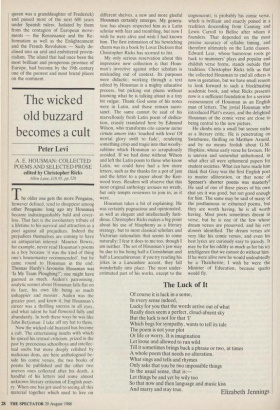The wicked old buzzard becomes a cult
Peter Levi
A. E. HOUSMAN: COLLECTED POEMS AND SELECTED PROSE edited by Christopher Ricks
Allen Lane, £18.95, pp.528
The older one gets the more Penguins, however defined, tend to disappear among other Penguins: long ago my Housman became indistinguishably bald and cover- less. That fact is the involuntary tribute of a lifetime to his survival and attraction as a poet against all prejudices. Indeed the prejudices themselves are coming to have an antiquarian interest: Maurice Bowra, for example, never read Housman's poems as a boy because 'it was the kind of thing one's housemaster recommended', but he came round to Housman in the end. Thomas Hardy's favourite Housman was 'Is My Team Ploughing?'; one might have guessed as much. Auden's patronising, analytic sonnet about Housman falls flat on its face, his own life being so much unhappier and messier. Auden was the greater poet, and knew it, but Housman's career was a thrilling success in all eyes, and what talent he had flowered fully and abundantly. In both these ways he was like John Betjeman: I take off my hat to them.
Now the wicked old buzzard has become a cult. The entertaining insults with which he spiced his textual criticism, prized in the past by precocious schoolboys and intellec- tual snobs but more deeply relished by malicious dons, are here anthologised be- side his comic verses, the two books of poems he published and the other two uneven ones collected after his death, a handful of his letters and some almost unknown literary criticism of English poet- ry. When one has got used to seeing all this material together which used to live on different shelves, a new and more gleeful Housman certainly emerges. My genera- tion has always respected him as a Latin scholar with fear and trembling, but now I wish he were alive and wish I had known him. The first intimation of his bewitching charm was in a book by Lovat Dickson that Christopher Ricks has scorned to list.
My only serious reservation about this impressive new collection is that Hous- man's invective against other scholars is misleading out of context. Its purposes were didactic; working through a text edited by Housman is a mighty educative process, but picking out plums without knowing what he is talking about is a tiny bit vulgar. Thank God some of his notes were in Latin, and those remain sacro- sanct. The same cannot be said of his marvellously fresh Latin poem of dedica- tion, crassly translated here by Edmund Wilson, who transforms cito casurae tactus virtutis amore into 'touched with love/ Of mortal glory swift to fade', rendering something crisp and tragic into that woolly- sublime which Housman so scrupulously avoided. If we had done without Wilson and left the Latin poem to those who know Latin, we could have had a few more letters, such as the thanks for a pot of jam and the letter to a paper about the Ken- wood trees. Readers will observe that this most original anthology arouses no wrath, but only tempts reviewers to join in, as it were.
Housman takes a bit of explaining. He was certainly pugnacious and opinionated, as well as elegant and intellectually fasti- dious. Christopher Ricks makes a big point about his use of blasphemy as a literary strategy, but to most classical scholars and Victorian rationalists that seems to come naturally; I fear it does to me too, though I am neither. The set of Housman's jaw may be due to his being half a Cornishman and half a Lancashireman: if you try reading his jokes in a Lancashire accent, they fall wonderfully into place. The most under- estimated part of his works, except to the
cognoscenti, is probably his comic verse, which is brilliant and exactly poised in a tradition descending from Canning and Lewis Carroll to Belloc after whom it founders. That depended on the most precise accuracy of syllabic timing, and therefore ultimately on the Latin classics. Edward Lear, whose •humorous roots go back to mummers' plays and popular and childish verse forms, stands outside that tradition. Christopher Ricks tells us that the collected Housman to end all others is now in gestation, but we have small reason to look forward to such a blockbusting academic book, and what Ricks presents now is a sufficient foundation for a serious reassessment of Housman as an English man of letters. The jovial Housman who introduced Platt's essays, and the delighted Housman of the comic verse are close to being central to the new picture.
He climbs into a small but secure niche as a literary critic. He is penetrating on Swinburne, thrilling on Matthew Arnold, and by no means foolish about G.M. Hopkins, whose early verse he favours. He is uneven and somewhat unbuttoned, in what after all were ephemeral papers for student societies. What can have made him think that Gray was the first English poet to master alliteration, or that none of Spenser's shorter poems was masterly? He said of one of these pieces of his own that yes it was good, but not good enough for him. The same may be said of many of the posthumous or exhumed poems, but they are worth having, he is all worth having. Most poets sometimes dream in verse, but he is one of the few whose dream verses are preserved, and his vers donnes identified. The dream verses are very like his comic verses, and even his best lyrics are curiously easy to parody. It may be for his oddity as much as for his icy intelligence that we cannot do without him. If he were alive now he would undoubtedly be a Thatcherite; I wish he were the Minister of Education, because sparks would fly.






















































 Previous page
Previous page